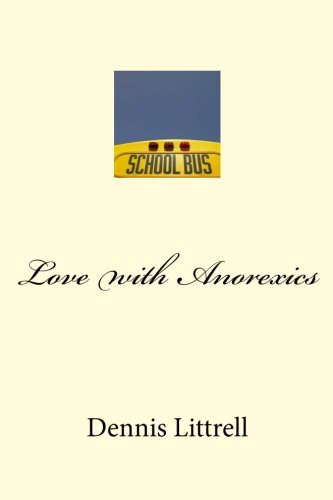 Why should you care about HIGH SCHOOL FROM HELL, a semi-autobiographical novel by Dennis Littrell, an ex-high school English teacher? In truth you probably shouldn’t care, as it’s not a very good book, but for me it will always be of special interest due to the fact that I was one of Mr. Littrell’s students.
Why should you care about HIGH SCHOOL FROM HELL, a semi-autobiographical novel by Dennis Littrell, an ex-high school English teacher? In truth you probably shouldn’t care, as it’s not a very good book, but for me it will always be of special interest due to the fact that I was one of Mr. Littrell’s students.
HIGH SCHOOL FROM HELL (which appears to be the same book as LOVE WITH ANOREXICS, another self-published Littrell novel that appeared a year after this one) has been something of a legend among Littrell alumni since it was initially completed in the mid-nineties. It was around then that a friend and fellow Littrell grad entered the bookstore where I was working and made me aware of the book’s existence. Littrell had apparently given out copies of the manuscript to a select few of his students; my friend wasn’t among those lucky few but knew someone who was, who gave him an earful about HIGH SCHOOL FROM HELL’S contents—which were then conveyed to me that fateful day in the bookstore.
The book was, my friend claimed, about a fortyish high school teacher whose wife dies of cancer—a fate that actually befell Dennis Littrell’s spouse—and that teacher’s “unhealthy obsession” with his girl students. My friend further claimed that Littrell had tried to interest the New York publishing houses in the book, but had no luck. Ultimately it took until 2011 for this highly sought-after (by me) text to finally see publication, courtesy of the author himself (with the perfunctory cover art and none-too-arousing back cover synopsis—“He was a teacher who loved his students; otherwise how could he be a teacher of other’s people’s children? But again, perhaps he loved them too much”—attesting to its self-published status).
It’s a fact that most of us, even a less-than-willing student such as I, tend to look up to and even idolize our teachers, including the mild-mannered Mr. Littrell. Thus I was quite shocked upon learning of HIGH SCHOOL FROM HELL’S subject matter, and even more so when I finally read it.
Beginning with the dedication “This novel, which celebrates teachers, is dedicated to teachers, especially teachers in the public schools of America who have done so much for all of us” (given the contents I doubt many teachers will appreciate that dedication), it tells the story of Roland Flaubert, a failed actor who takes a job teaching English at Palm Latitudes High School. Flaubert is a rather blatant stand-in for Dennis Littrell, down to the physical descriptions (including the “wine red Gorbachev birthmark above his mustache to the left of his nose” that likewise marked Mr. Littrell) and homework he gives (such as an essay beginning with the words “Prose blows,” which I recall Mr. Littrell assigning), while Palm Latitudes HS is a thinly disguised variant on Manhattan Beach, CA’s Mira Costa High School.
Flaubert, as previously mentioned, has an unhealthy fixation on his girl students—who apparently “were, all of them, sexually mature regardless of what society said…“Sweet sixteen” wasn’t just an idle phrase.” The reasons for Flaubert’s fixations, we learn, are due to his flight attendant wife Kelly, who stopped having sex with him ten years earlier; the revelation of what triggered her abstinence is unveiled in the final pages (semi-spoiler: that revelation isn’t especially interesting or exciting). Thus, Flaubert is seeking from his students the love denied him at home.
One of the primary recipients of Flaubert’s attentions is Jennifer, a troubled young woman with whom Flaubert insists on keeping in touch after she graduates, via encounters that cross the line into outright stalking. No, Flaubert never crosses the line with Jennifer, but his infatuation is far from platonic, as is revealed in a truly vile rape fantasy unveiled during a psychiatric encounter. Jennifer is likewise drawn to Flaubert, the reasons for which (as with the third act revelation of Flaubert’s wife’s problems) aren’t made clear until the end of the book.
Another problem facing Flaubert is Kelly, who has contracted cervical cancer. The details of that cancer’s ravages are extremely graphically rendered, constituting the book’s most affecting portions. Littrell claims that publishers encouraged him (correctly in my view) to redraft the text to focus primarily on this subplot, but he refused.
Thus we’re left with a novel bearing some pretty grievous flaws, a couple of which were adequately summed up by the author himself: “It’s too long and rambles around a bit too much. Additionally I use several different narrative techniques which might confuse or annoy readers.” The novel is indeed overlong and rambling (with some seriously dull chapters detailing Flaubert and Jennifer’s past relationships), and, yes, contains a number of distracting stylistic quirks (chapters related in screenplay form, etc.) that serve no evident purpose.
The book deserves points, at least, for effort: the gambit of making Flaubert both the protagonist and antagonist is laudable, even though it’s unsuccessful. Frankly, I found Flaubert to be a despicable, self-righteous asshole from start to finish, and the book overall a singularly ugly and depressing piece of work.
A not-dissimilar effect was produced by Dennis Littrell’s debut novel A PERFECTLY NATURAL ACT, published by Putnam in 1973. About a disturbed man who murders his wife and, believing himself invisible, embarks on a depraved rape spree, it’s a dark and unsettled book that like HIGH SCHOOL FROM HELL pivots on sex and its destructive properties (and to think, Mr. Littrell once chastised me back in the day for my “obsession with sex and violence”).
As to how much of the sordid content of these books resides in the real Dennis Littrell, that’s obviously a matter of conjecture. Given that both novels are distinguished by an unsparing honesty, I’d say it’s safe to surmise that the unsettled psychology they air is not entirely fictional. Likewise, an entry on the author’s personal blog entitled “Loving the Girls,” in which Littrell admits to having taken a special interest in his girl students during his years teaching at Mira Costa (although he takes pains to point out that interest was not sexual in nature), attests that Roland Flaubert’s compulsions aren’t that far removed from reality.
One passage of HIGH SCHOOL FROM HELL, at least, is clearly fictional: a climactic interrogation in which Flaubert is questioned about his beliefs in front of an assembly attended by all the book’s major characters, with his answers being so profound they leave many audience members in tears. It’s a thoroughly unconvincing sequence that does nothing to alleviate the book’s overall dourness, and would have doubtless gotten me a bad grade had I turned such a passage in to Mr. Littrell back in the day. For that matter, I think the entire book would have drawn the ire of Dennis Littrell the English teacher, and rightfully so, being C level work that should have gotten an A.

